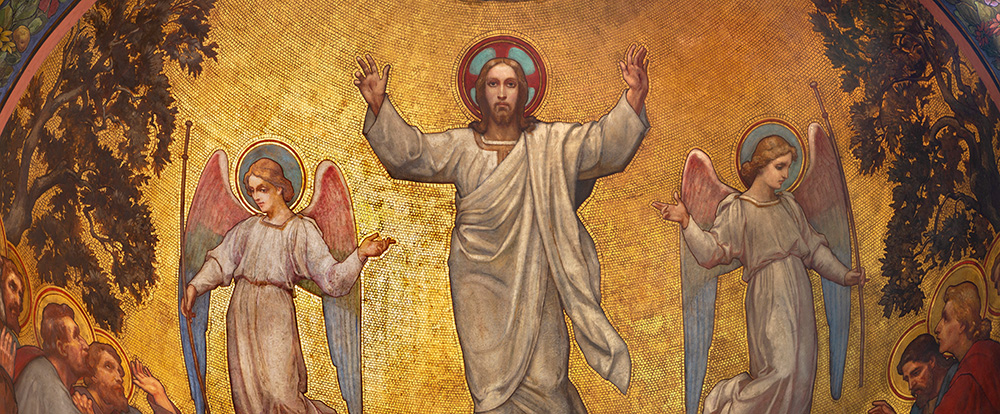There is no disputing that Easter represents the high point of the liturgical year. In it we celebrate our salvation. Our liberation by Christ from the reign of death which held us captive, which tried but failed to hold him captive in the tomb. During this time of pandemic and quarantine, though, in which so many might be unable to experience the proper liturgical setting for this celebration, our experience of liberation and release from captivity necessarily has a muted quality.
But all too often we forget that this Easter celebration is not that of a single day, one-off event, but rather a season. And central to the proper celebration of the Easter season is the prayerful observance of Christ’s ascension — the culmination of the Lord’s ministry and the necessary precursor to the promised outpouring of the Holy Spirit at Pentecost.
Modern Christians might be susceptible to incredulity, or at least befuddlement, around this feast, with its seemingly mythological accounts of terrestrial-celestial movement. And there is the consequent temptation to downplay its significance. That tendency is not helped by shifting the feast’s commemoration — in one place Thursday, in another Sunday — often suggesting, perhaps, a willingness to downplay what might be dismissed as a kind of narrative afterthought in the life of Christ.
But seeing things that way could not be further from the truth. That’s because the Ascension, in addition to the Resurrection, fulfills Christ’s saving mandate. Perhaps we have overemphasized the Resurrection in this way to the neglect of the Ascension, rather than appreciate their inextricable link, because of our widespread confusion about what exactly salvation is.
Salvation is Christ’s overcoming sin and its gravest consequence: death. It is sin and death that bring every human effort to naught. If Christ had not been raised from the dead — unmasking death’s own futility, bringing death to death itself — then his ministry would itself have been in vain. And if he did not make us partakers in his own resurrection, if we were still excluded from his victory over death, then our lives would still be subject to the tyranny of futility. But he has triumphed over death, and he has made us sharers in that victory. And all this is the source of our joy on Easter morning.
But recall the words of Christ on that first Easter Sunday: “Do not hold on to me!” Why? Because as he says to Mary, “I have not yet ascended to the Father” (Jn 20:7). That is to say, he is not finished. He has not yet fully accomplished what he has come to do, and essential to accomplishing it is his very ascent to the Father.
What, therefore, has he come to do? Well, of course, to free us from sin, death and their resultant futility. But that freedom from is achieved precisely so that we once more might experience a freedom for: the freedom to live for God fully.
There is a basic dynamic to God’s relationship with his creation and creatures. Everything that is not God comes forth from God as pure gift, since creation did not have to be and, therefore, is owed nothing. Coming forth from God happens, however, so that this creation can share in God’s life and love. And that ability to share in God is the extraordinary gift that surpasses the already unmerited gift of simply existing.
But we refused that gift. We refused that share. We severed the connection. Christ came among us to restore that relationship, and he did so, not only by overcoming the division, but by drawing us once more into the mystery of God. He reestablished our union with God in a way that not only restores what had been lost (what is achieved at Easter), but in a way which also surpasses what even was (which is what he does through his Ascension). He does this by forever uniting our now perfected creaturely nature with God himself: when he ascends to the Father, the flesh of the crucified and risen Christ — the flesh we share — is seated at God’s right hand forever.
Perhaps we would do well to pay special attention to that mystery of the ascended flesh of Christ in this moment of global pandemic, when we are on a daily basis (or even hourly) reminded of the fragility of our existence in the flesh. All we need to recall as Christians, when we gaze upon the broken bodies of our COVID-ravaged brothers and sisters, and the resulting brokenness in society as a product of the pandemic, is the broken body of our brother Christ. It is that broken and beaten flesh that not only rises transformed from the grave — still bearing the wounds, the signs of vulnerability — but ascends to be joined with the Father forever. It speaks the truth that our individual and collective brokenness (a condition of which we are ever so aware in these uncertain times) is not the end of the story, but, through Christ, a prelude to glory.
Christ’s ascension is what clears the way for us. It is the Ascension that ensures the human-divine reunion. For those of us who must continue to persevere in our vulnerability, longing for that union, we must have fixed before us this central mystery of Christ’s life, seeing in it alone the source of our hope: that in our own flesh, we shall see God (Job 19:26).
Father Andrew Clyne writes from Maryland.

